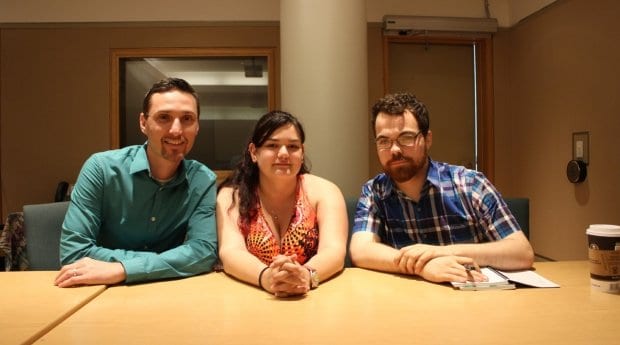The Ottawa Men’s Refuge is working to establish referral services and eventually shelter space for male victims of domestic violence.
Formed earlier this year as a subcommittee of the Ottawa Police Service GLBT liaison committee, the Men’s Refuge held a meeting on May 27 at Ottawa City Hall to consult with community organizations working in the anti-violence sector.
“We’re hoping to be an actual charity by the end of the summer and possibly working as some kind of a referral service within the next year or two,” says Luke Smith, who chaired the meeting. “It’s taken decades to get [violence against women] organizations to where they are and it’s going to take as much work for us to get to that point as well.”
Although statistics are hard to come by, the Men’s Refuge is looking into police records to find the number of incidents where men experienced intimate partner violence, Smith says. Regardless of sexual orientation, men in abusive relationships often find it hard to leave — and if they do leave, there’s not a specific shelter in Ottawa for male survivors of domestic violence, he says.
“Men are afraid they’re going to seem weak or not quite manly enough,” says Crystal Guillot, a volunteer with Men’s Refuge. “I think that’s a big piece of why men don’t want to come forward. They’re afraid of how other people are going to look at them.”
Guillot says she knows this is a long-term project, adding that it could be years before the Men’s Refuge has the resources to offer beds to men who are fleeing abuse.
Currently, there are about 10 people on the Men’s Refuge committee, including three police officers, says Smith, who’s the co-ordinator of the GLBT liaison committee. Once the Men’s Refuge becomes a registered charity, it will become its own organization, separate from the liaison committee, although the people who are currently volunteering for the Men’s Refuge will be offered seats as volunteer board members, Smith says. Diego Sarmales, a community member of the liaison committee, has offered to cover the cost of registering as a charity, which will be around $400, Smith adds.
Trysh Smith, an outreach worker from Harmony House Women’s Shelter, says she’s glad to hear the Men’s Refuge is consulting community groups and that it’s respectful of the work violence against women (VAW) organizations do.
“These gentlemen are thinking that they really want to learn with the VAW community and I think that that’s really important, because there’s been years of hard, hard work that the community has put in,” she says.
Luke Smith emphasizes the importance of the Men’s Refuge differentiating itself from men’s rights activism (MRA) groups. The Canadian Association for Equality (CAFE), an MRA group that has triggered complaints over its planned presence in Toronto Pride, put up a controversial billboard in March on Davenport Road in Toronto, showing a furious woman confronting a cowering man.
“Definitely not that,” Trysh Smith says, when asked what kind of messaging the Men’s Refuge should use to reach out to the community.
The billboard came under fire for its claims that domestic violence is evenly split between men and women. According to a Statistics Canada survey from 2009, 6 percent of males and 6.4 percent of females reported domestic abuse in the past five years. However, CAFE’s claim that domestic violence affects men and women equally ignores the same StatsCan survey results that show women are three times more likely to be sexually assaulted, beaten, choked or threatened with a gun or a knife by their partner or ex-partner. The survey also found women are three to four times more likely to be killed.
“We need to work collaboratively as quickly as possible so that we’re the viable option [to CAFE],” Luke Smith says. “I personally believe that our approach is founded in the feminist movement and founded on recognizing the work that has been done by the VAW community and that would be so integral to having the trust of the sector to be able to do this work. I’m not sure that CAFE has that trust.”
Shaun Reid, a child and youth counsellor at the Children’s Hospital of Eastern Ontario, says he feels strongly about preventing domestic violence and supporting people who feel trapped in violent relationships. Growing up, he witnessed male relatives who were violent toward their female partners, and female relatives who were violent toward their male partners.
“The idea of being able to make change in an area where I’ve personally seen the results of violence makes me feel really good,” Reid says. “I believe in the idea that everyone can be a victim of violence or domestic abuse or intimate partner violence and that something can be done about it.”
Trysh Smith agrees that violence can happen to anyone, regardless of gender or sexual orientation.
“I think that violence against anybody is a human rights violation,” she says. “I can get behind anything that wants to work against a human rights violation being allowed to happen in Canada in 2015.”


 Why you can trust Xtra
Why you can trust Xtra


